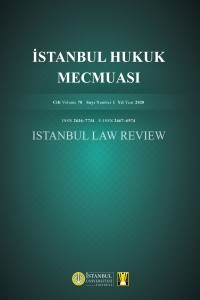A Study Over the Protectability of Ideas and Concept Leading to Computer Programs in Light of the Navitaire Judgement of the England and Wales High Court of Justice
Abstract
One of the fundamental issues of copyright law is the separation between ideas and works, and whether ideas are protected. The main aim of the copyright law is to protect existing concrete works, to promote the creation of new works and to provide a fair royalty in exchange for the authors’ labour. On the other side, intellectual progress shall not to be halted. Therefore, one of the main principles of the copyright law is to protect works instead of ideas. However, for some types of works, because of the interlock between idea and work, and the difficulty to separate them, some problems might occur such as extending the protection over the ideas as well. In computer programs, scope of protection covers the expression of a computer program in a computer language, i.e. concrete version of ideas and principles behind the computer program in the computer realm. In some circumstances, it might be requested that the protection for computer programs should also cover the functioning, underlying ideas and principles, interfaces and commands, operation logic, and even the look and feel of the program. In this work, in light of an English court’s decision, we will discuss the problems above within the frame of Turkish law.
References
- Aksu M, ‘Avrupa Adalet Divanının Bilgisayar Programlarının Fikir ve Sanat Eserleri Hukuku Çerçevesinde Korunmasına Dair 2 Mayıs 2012 Tarihli Sas Institute-World Programming Kararının Değerlendirilmesi’ [İÜHFM, Cilt 72, Sayı 1]
- – – ‘Bilgisayar Programlarının Eser Niteliği ile Bunların Temelinde Yatan Fikir ve İlkelerin Korunması Sorunu’ [Prof. Dr. Ali Güzel’e Armağan, 2010]
- Arslanlı H, Fikri Hukuk Dersleri II, Fikir ve Sanat Eserleri (1954)
- Ayiter N, Hukukta Fikir ve Sanat Ürünleri (1981)
- Bandey B, International Copyright in Computer Program Technology (1996) Bently L, Sherman B, Intellectual Property Law (Fourth Edition, 2014)
- Davis R, Quintin T, Tritton G, Tritton on Intellectual Property in Europe (Fifth Edition, 2018)
- Drexl J, What is Protected in a Computer Program (IIC Studies Volume 15, 1994) Erel Ş, Türk Fikir ve Sanat Hukuku (1989)
- Hirsch E, Hukukî Bakımdan Fikrî Sây (İkinci Cilt, 1943)
- Jacob R, Alexander D/Fisher M, Guidebook to Intellectual Property (Sixth Edition, 2013)
- Kaya A, ‘Bilgisayar Programlarının Şahsen Kullanmaya Mahsus Olarak Çoğaltılması Mümkün Müdür?’ [Makalelerim I, 2012]
- Prime T, Booton D, European Intellectual Property Law (2017)
- Tekinalp Ü, Fikri Mülkiyet Hukuku (5. Bası, 2012)
- Topaloğlu M, Bilgisayar Programları Üzerindeki Haklar ve Bu Hakların Korunması (1997)
- Yarsuvat D, Türk Hukukunda Eser Sahibi ve Hakları (1984)
İngiltere ve Galler Adalet Divanının “Navitaire Kararı” Işığında Bilgisayar Programlarına Esas Fikrin ve Konseptin Korunabilirliği Üzerine Bir Inceleme
Abstract
Fikri mülkiyet hukukunun en temel konularından birisi fikir ile eser ayrımı ve fikrin korunup korunmayacağı hususudur. Fikri mülkiyet hukukunun amacı halihazırda meydana getirilmiş eserlerin korunması, yeni eserlerin üretiminin teşvik edilmesi ve eser sahiplerinin emeklerinin karşılığının sağlanabilmesidir. Ancak diğer taraftan bu koruma ile fikri gelişimin önünün de tıkanmaması gerekir. İşte bu nedenle, fikri haklar bakımından en temel ilkelerden birisi fikrin değil eserin korunmasıdır. Öte yandan bazı eser türlerinde fikir ile eserin iç içe geçmesi ve ayırt edilmesinin zorluğu karşısında, koruma alanının fikir kısmına da genişlemesi gibi sorunlar ile karşılaşılabilmektedir. Bilgisayar programlarında da koruma konusu esasen bir programın bilgisayar dilinde ifade ediliş biçimi, yani programın arkasındaki fikir ve ilkelerin bilgisayar ortamında somutlaşmış halidir. Bazı hallerde ise bilgisayar programının korunmasının, bu programın işleyiş biçimine, altında yatan ilkeler ve fikirlere, programda yer alan arayüz ve komutlara, programın çalışma mantığına ve giderek programın görünüm ve hissine de sağlanması talep edilebilmektedir. Bu çalışmamızda bir İngiliz mahkemesi kararı çerçevesinde Türk hukuku bakımından yukarıda arz edilen bu sorunlar ele alınacaktır.
Keywords
Supporting Institution
Yazarlar bu çalışma için finansal destek almadığını beyan etmiştir.
References
- Aksu M, ‘Avrupa Adalet Divanının Bilgisayar Programlarının Fikir ve Sanat Eserleri Hukuku Çerçevesinde Korunmasına Dair 2 Mayıs 2012 Tarihli Sas Institute-World Programming Kararının Değerlendirilmesi’ [İÜHFM, Cilt 72, Sayı 1]
- – – ‘Bilgisayar Programlarının Eser Niteliği ile Bunların Temelinde Yatan Fikir ve İlkelerin Korunması Sorunu’ [Prof. Dr. Ali Güzel’e Armağan, 2010]
- Arslanlı H, Fikri Hukuk Dersleri II, Fikir ve Sanat Eserleri (1954)
- Ayiter N, Hukukta Fikir ve Sanat Ürünleri (1981)
- Bandey B, International Copyright in Computer Program Technology (1996) Bently L, Sherman B, Intellectual Property Law (Fourth Edition, 2014)
- Davis R, Quintin T, Tritton G, Tritton on Intellectual Property in Europe (Fifth Edition, 2018)
- Drexl J, What is Protected in a Computer Program (IIC Studies Volume 15, 1994) Erel Ş, Türk Fikir ve Sanat Hukuku (1989)
- Hirsch E, Hukukî Bakımdan Fikrî Sây (İkinci Cilt, 1943)
- Jacob R, Alexander D/Fisher M, Guidebook to Intellectual Property (Sixth Edition, 2013)
- Kaya A, ‘Bilgisayar Programlarının Şahsen Kullanmaya Mahsus Olarak Çoğaltılması Mümkün Müdür?’ [Makalelerim I, 2012]
- Prime T, Booton D, European Intellectual Property Law (2017)
- Tekinalp Ü, Fikri Mülkiyet Hukuku (5. Bası, 2012)
- Topaloğlu M, Bilgisayar Programları Üzerindeki Haklar ve Bu Hakların Korunması (1997)
- Yarsuvat D, Türk Hukukunda Eser Sahibi ve Hakları (1984)
Details
| Primary Language | Turkish |
|---|---|
| Subjects | Law in Context |
| Journal Section | Research Articles |
| Authors | |
| Publication Date | March 31, 2020 |
| Published in Issue | Year 2020 Volume: 78 Issue: 1 |

